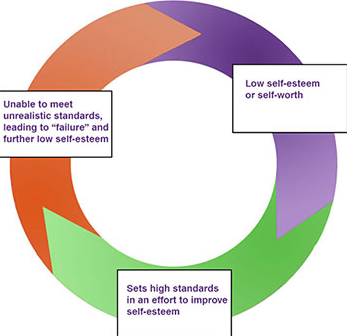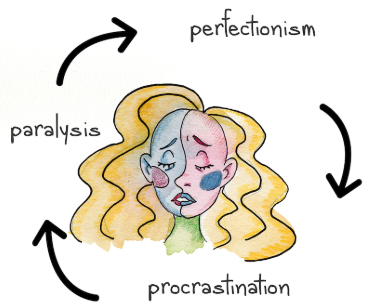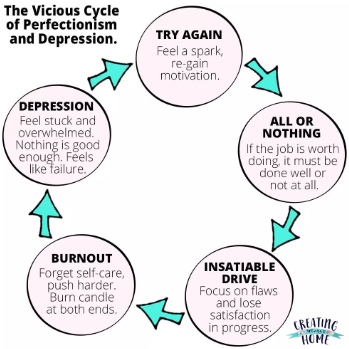Perfectionism Against Humanity
Perfectionism is a crime against humanity. While society may view perfectionism as simply having strong goals and high standards for oneself, in reality, we only have limited understanding of how damaging perfectionism can be, and the horrors it eventually leads to. The propensity toward perfectionism has been linked to depression, anxiety, countless mental health disorders, and even suicide. An idea has been implanted in our heads, impacted by numerous sources depending on the individual’s experiences, that mistakes are failures. In actuality, mistakes are necessary for personal growth and development. Perfectionism gradually kills a human being, causing psychological disorders and allowing no room for mistakes; therefore, allowing no opportunity to become a stronger individual.
Get Help With Your Essay
If you need assistance with writing your essay, our professional essay writing service is here to help!
Perfectionism stems from multiple places and different influences, whether it be social media, a close friend, or fast-paced society. Unfortunately, the prime source of influence is our parents. The pressure to do better begins at a young age, and our inner critic is born. Throughout the years of adolescence and continuing, our inner critic feeds off comparison, judgements, and high standards. According to Jonathan Alpert, psychotherapist and author, the messages we receive in our childhood environment correlates to the way our mind functions today. Alpert says, “Early on, a perfectionist may receive mixed messages from parents: "Good job, Johnny... but you can do better," or "Getting a B is good, but an A is better” (Alpert). This simultaneous criticism and praise sends a mixed message to the child, creating a drive to satisfy the parent, to do better, even when the child is putting forth their best effort, which should always be the ideal standard. Rather than attempting to give their all, fear then underlies the thinking of the perfectionist. Amelia Harnish, senior writer of Health magazine, states that:
Exacting expectations of parents put critical pressure on kids that can stick with them forever. Our studies show that is associated with perfectionism. It’s transmitted in subtle ways. There’s a modeling effect, so that parents who are obsessively concerned with mistakes raise children who are, too. And there’s an interpersonal effect, transmitted by an authority figure in a child’s life who is overly critical and demanding (Harnish).
In my personal experience, through several therapy sessions, I have connected almost all my behavior patterns to how my parent taught me to act and react throughout my adolescence. Based on their responses, whether it was praise or disapproval, as a child I took on these behaviors. Naturally, when I received disapproval without positive words as well, I felt poorly about myself and my abilities. Sadly, even my negative behaviors are mirrored from my parents, seeing their actions benefiting them, as I was a child. Svetlana Whitener, Founder & Chief Coaching Officer at InLight Coaching, states, “You need to understand the difference between a high achiever and a perfectionist. They both aim for an excellent outcome. However, the perfectionist is absorbed with end results and doesn’t really enjoy the journey of getting there” (Whitener). The following diagram represents the distorted thinking of a perfectionist, following from the green section, which is the accepted section for standard goal setting.

Fig. 1. Self-perpetuating cycle of perfectionism from Eating Disorders Victoria; https://www.eatingdisorders.org.au/eating-disorders/what-is-an-eating-disorder/risk-factors/perfectionism.
The orange section is a reflection of the shame people feel when expectations from others, or from oneself, are not met. Next, the purple section demonstrates one’s low self worth coming into the picture. In order to do better, expectations are then set again, according to the green section. The green section isn’t necessarily bad, since setting high goals is a healthy thing to do. It’s how we manage ourselves when these goals aren’t met. All types of perfectionists share this basic mindset, one way or another.
There are three main types of perfectionists. The first is the “self oriented perfectionist”, the extreme and harsh self critic, who strives to never hit failure, seeing mistakes as failures’ equal. This is the stereotypical type of perfectionist who you may see as the obsessive CEO of a large corporation. The second type has their eyes on others’ expectations. Referred to as the “socially prescribed perfectionism”, external pressure and comparison will result in them attempting to be perfect in all aspects of life. This could be the mean girl at your local high school who, on the outside, acts like she has it all together, but in reality has a very low self esteem. The final type of perfectionist is called the “other oriented perfectionism”, in which the person has incredibly high standards for others (Good Therapy). They need everyone around them to be at a certain level, and usually have an aggressive manner. They are overly critical of his or her own performance. An example of an other oriented perfectionist is Steve Jobs, who is depicted to have held overly high expectations of those around him, resulting in degradation of others. A common question posed is around the lines, “well, what’s the difference between high achievers and perfectionists?” The spectrum is not super broad, instead there is a fine line between the two. Perfectionists have an excessive need for approval and are fearful of making mistakes. They are different from high achievers who are driven to reach a goal, while perfectionists are driven by fear of failure or showing weakness, making them completely out of control of their lives.
These ways of distorted thinking cause a perpetual cycle where there is absolutely no room for self acceptance because of mistake denial. It lowers one’s ability to take risks and put themselves out in the world. The fear of so called “failure” reduces creativity and innovation, and we can never reach full potential putting up these barriers. Constant self evaluation leads to the “could've, would've, should’ve stages” (Ruggeri). A senior journalist and editor from BBC News, Amanda Ruggeri, shares her story, stating:
Something as small as accidentally squashing the panettone I was bringing my boyfriend’s family for Christmas can tumble around in my mind for several days, accompanied by occasional voices like ‘How stupid!’ and ‘You should have known better.’ Falling short of a bigger goal, even when I know achieving it would be near-impossible, can temporarily flatten me (Ruggeri).
Have you ever looked back on a moment and thought, “I could’ve done better?” It is extremely common to wish past moments could’ve gone differently. However, it is a malicious and self defeating cycle that will only continue to take us down. It reinforces that we are simply not acceptable just as we are. It is bolded on Health.com to get rid of the word, should, and continues to preach,“Perfectionists are obsessed with this word: ‘I should be the best!’ Instead, help your friend or loved one ask why should?” (Harnish). The real question is why do you wish for that moment to have gone differently? It is time to truly and genuinely accept that we cannot control and obsess over what we cannot change, all mistakes and failures included. It is a waste of time and energy because we always have to keep moving forward.
According to Good Therapy Organization, perfectionism comes with several domains. It can impact one domain, or even all domains for some people (“Perfectionism”). The domains include perfectionistic deals at the workplace or school, in one’s physical appearance, and materialism, friendships or in intimate relationships, during physical activity, in one’s surroundings and environment, hygiene or health, and how one writes or speaks. The combinations differ for everyone, but is certain that perfectionism has become a worldwide disease. It is a virus that spreads incredibly fast, feeding off societal standards and once again, the home environment and our intimate influences.
The statistics are spreading like wild fires. “As many as two in five kids and adolescents are perfectionists,” says Katie Rasmussen, who researches child development and perfectionism at West Virginia University. “We’re starting to talk about how it’s heading toward an epidemic and public health issue” (Rasmussen). Once a perfectionist mindset is in place, it takes immense work to reverse already implanted way of thinking. Also according to Rasmussen, among men suicide rates have quadrupled and women are much more likely to be textbook perfectionists. If your parents, friends, and environment in general practice have a certain way of doing thing; all A’s in school, number one on the basketball team, perfect body, etc, this is the life you know and will continue to know. On the other hand, we choose to let go and look straight into our most vulnerable places. The image below describes the intensity of perfectionist thinker, differentiating their expectations from simply having high standards.

Fig 2. A Perfectionist view of the world from a Medium Corporation, https://medium.com/@gloriafeng2/on-perfectionism-20980476f6ce.
Using fun terms and comparisons, under the humor in this image lies a key concept. Perfectionist can never be in the “sea of mediocrity.” Perfectionists will continue to hold an unrealistic mindset, with unrealistic goals.
Perfectionism leads to various mental health disorders, all linking back to the root; perfectionism. According to the senior editor at BBC, Amanda Ruggeri:
Perfectionistic tendencies have been linked to a laundry list of clinical issues: depression and anxiety (even in children), self-harm, social anxiety disorder and agoraphobia, obsessive-compulsive disorder, binge eating, anorexia, bulimia, and other eating disorders, post-traumatic stress disorder, chronic fatigue syndrome, insomnia, hoarding, dyspepsia, chronic headaches, and, most damning of all, even early mortality and suicide (Ruggeri).
Of course, all of this data is extreme and may be alarming. However, keep in mind that these disorders come from the constant struggle to be perfect, not from here and there perfectionist tendencies. The fatal consequences come into play when perfectionism becomes a habit. Prem Fry, a psychology Professor at Trinity Western University, linked perfectionism to the risk of death. The study consisted of 450 adults aged 65 and older for a period of 6.5 years. The candidates completed questionnaires to assess their level of perfectionism as well as other personality attributes. Those with high scores, the ones who placed high expectations on themselves to be perfect, had a 51-percent increased risk of death compared to those with low scores (Fry). The Review of General Psychology finds that “Perfectionists are very likely to struggle with anxiety and depression, and ultimately, they're very likely to commit suicide”(American Psychology Association). Suicide is such a big issue in our nation, especially among teens, and a majority of teen girls perfectionistic practices stem from their body insecurities.
Eating disorders have also joined this list, and have become extremely common throughout society today. Cynthia Bulik, University of NC, a highly regard expect in the field of eating disorders states that:
Personality factors such as negative emotionality and perfectionism contribute to the development of eating disorders. However, these factors (negative emotionality and perfectionism,) may be influenced indirectly by increasing susceptibility to internalization of] the thin ideal (International Journal of Eating Disorders).
Along with eating disorders comes obsessive behavior, and furthermore black and white thinking, all contributing to perfectionism. Bulik’s patients express that their perfectionism tendencies go way back before they acquired an eating disorder. Bulik continues to say:
Young girls who are highly perfectionistic and punish themselves unduly for perceived
failures can be helped to learn how to give themselves a break and set more realistic
goals. All over the media, young women are in constant sight of models, flat, toned, and
‘perfect’ stomachs. They are influenced by this, admire it, and automatically yearn to
reach such an image, bringing obsessive thinking into the picture. Millions watch the
Victoria’s Secret fashion show in New York, but how many can separate themselves from
the figures of 5’11 models (Bulik)?
Small signs of behavior also may be signs of perfectionism. Being over controlling, no cutting corners, and impulsive decisions are just a few examples. By doing so, perfectionists momentarily feel in control by being rigid to the extreme. But in reality, they are absolutely out of control, unhappy with themselves, and will eventually have a serious meltdown resulting from the incapability to meet such standards. Societal factors, such as the models in magazines, or race to the best ivy league college play a huge role as well. Carrie Paulus of Vanderbilt University not only correlates perfectionism with societal factors, but states that perfectionism is the result of societal pressure:
Much of the research confirms assumptions that rigid and controlling personality traits such as perfectionism are highly correlated with people afflicted with eating disorders. These personality dimensions such as perfectionism and obsessive-compulsive traits are often the result of intense sociocultural pressures which drive our modern, fast paced society (Paulus).
The image below describes the mindset shared by all types of perfectionists, conveying the emotional struggle and stress that come with perfectionistic thinking.

Fig 3. “Perfectionism is exhausting. It steals your time, your energy, your joy, your life” from Ravishly.https://ravishly.com/you-arent-lazy-you're-just-terrified-paralysis-and-perfectionism-mental-health
The links of perfectionism to disorders are endless. PhD, Amelia Harnish says:
Interestingly, perfectionists are also more likely to have chronic or unexplained fatigue and pain syndromes like fibromyalgia. A perfectionist says 'I don't have time to take care of myself. I must be the perfect mother and the perfect boss,' and their bodies just give out. Perfectionism causes an unbearable amount of stress, which has been linked to everything from heart disease to irritable bowel syndrome (Harnish).
The list continues and continues, keeping in mind that, based on the individual's perfections patterns and experiences, it will be different for everyone. Katharina Star, PhD, sums it up:
People with anxiety disorders, such as obsessive-compulsive disorder (OCD), social anxiety disorder, and panic disorder, may be even more prone to issues of perfectionism. Having unrealistic expectations about the self can contribute to increased feelings of anxiety, dissatisfaction, and difficulty coping with symptoms (Star).
The following cycle breaks the link of depression and perfectionism into simple steps.

Fig 4. The Vicious Cycle of Perfectionism and Depression from Creating Mary’s Home. https://creatingmaryshome.com/vicious-cycle-perfectionism-depression/.
The answer seems simple, just don’t be a perfectionist! Unfortunately, it is far from easy to train the mindset to leave behind a perfectionistic cycle, and even more difficult to create a new one. As human beings, we do what we know, and to reiterate, our childhood experiences and parental influences play an enormous part, then comes society. The first step, admit you are a perfectionist and admit that it is causing the deterioration of your life and overall well being. Most importantly, admit it is affecting the ability to be happy as you are. If we choose to perpetuate or ignore the signs, the negative side effects will never stop, and they will become hefty. Perfectionism is a killer on a human being, seeing failure as weakness instead of as data, further introducing a list of mental health disorders. “The worst thing is the belief that self worth is contingent on performance- that if you don’t do well, you’re worthless. It’s possible to escape that thinking.” - Randy Frost. You make it possible.
Works Cited
- Alpert, Jonathan. “How to Keep Perfectionism From Messing Up Your Life.” Inc, www.inc.com/jonathan-alpert/is-perfectionism-messing-up-your-life.html.
- Harnish, Amelia. “How Perfectionism Could Be Killing You.” Health Magazine, 3 October 2014, www.health.com/depression/why-perfectionism-could-be-killing-you.
- Harvard Medical School. “Trying to be Perfect Can Cause Anxiety.” Harvard Health Publishing, www.health.harvard.edu/mind-and-mood/trying-to-be-perfect-can-cause-anxiety.
- Marano Estroff, Hara. “Pitfalls Of Perfectionism.” Psychology Today, 1 March 2008, www.psychologytoday.com/us/articles/200803/pitfalls-perfectionism.
- Maxwell, Victoria. “The Vicious Triangle of Perfectionism.” Psychology Today, 19 Jan 2012, www.psychologytoday.com/us/blog/crazy-life/201201/the-vicious-triangle-perfectionism-anxiety-depression.
- “Perfectionism.” Good Therapy. www.goodtherapy.org/learn-about-therapy/issues/perfectionism.
- Rettner, Rachael.“The Dark Side of Perfectionism Revealed.” Live Science, 11 July 2010, www.livescience.com/6724-dark-side-perfectionism-revealed.html.
- Ruggeri, Amanda. “The Dangerous Downsides of Perfectionism.” BBC, 21 February 2018, www.bbc.com/future/story/20180219-toxic-perfectionism-is-on-the-rise.
- Scheel, Judy. “Perfectionism: Inherited or A Psychological Solution?” Psychology Today, 15 April 2015, www.psychologytoday.com/us/blog/when-food-is-family/201504/perfectionism-inherited-or-psychological-solution.
- Smith, Ann W. “Why Being A Perfectionist Can Make You Depressed.” Everyday Health, 23 July 2013, www.everydayhealth.com/depression/being-a-perfectionist-can-make-you-depressed.aspx.
- Star, Katharina. “How Perfectionism Can Impact Panic and Anxiety.” VeryWell Life, 13 October 2018. https://www.verywellmind.com/perfectionism-and-panic-disorder-2584391.
- Tabaka, Marla. “8 Signs You’re a Perfectionist (and Why It’s Toxic to Your Metal Health).” Inc, https://www.inc.com/marla-tabaka/8-signs-you're-a-perfectionist-and-why-its-toxic-to-your-mental-health.html.
- Whitener, Svetlana. “Why Being a Perfectionist Can Hold You Back.” Forbes Magazine, 2 Jan 2018, https://www.forbes.com/sites/forbescoachescouncil/2018/01/02/why-being-a-perfectionist-can-hold-you-back/#4cf709b9d1df.
Cite This Work
To export a reference to this article please select a referencing style below:


